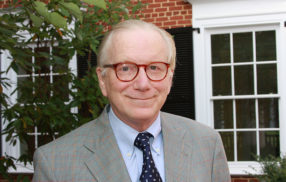
The Rise of Consumer-Based Engagement and Other Insights From the Darden Leadership Communication Council
By Jay Hodgkins
The corporate functions of marketing and communication have always been intermingled, and they will only get closer as communication department-style storytelling becomes more important with the rise of content-based marketing.
“There has to be total strategic and tactical alignment” between the two departments, legendary corporate marketing chief Joe Tripodi said during the University of Virginia Darden School of Business Leadership Communication Council 2020 meeting. Serving as the featured speaker in the council’s annual James Rubin Conversation, named in honor of the late Darden Professor James Rubin, Tripodi served as the chief marketing officer at six companies, including Subway, The Coca-Cola Company, Seagram’s and Mastercard. He led the creation of Mastercard’s “Priceless” and Coca-Cola’s “Open Happiness” campaigns, which both won prestigious Cannes Lions awards.

Joe Tripodi, pictured during his time serving as chief marketing officer of The Coca-Cola Company
Speaking virtually to a council of corporate communicators led by Darden Professors June West and Steve Soltis, Tripodi said new digital technologies and social media have disrupted the old way of marketing that was often heavily focused on TV and other conventional forms of advertising. At a company like Coca-Cola, Tripodi said consumer-created content is up to 90 percent of the creative content being shared among consumers; not company creative content.
“The intrusion-based marketing model is dying,” he said. “It’s no more ‘spray and pray.’ Now, it’s consumer-based engagement.”
Though the skills of communicators are more valuable than ever in this new landscape, Tripodi acknowledged that many companies have not adjusted by bringing their communications teams and skills to the core of the marketing decision-making process. For communicators who don’t have a seat at the table, Tripodi urged them to fight for one.
“My primary advice is to insert yourself in the process early on so you can see how the baby is being made rather than being handed something at the end,” Tripodi said. “You must not have a wall. Figure out a way to force your way in and get people to see the bigger picture of the synergy between [marketing and communications].”
Another issue in this new era of content-based marketing is unlocking the power of employees to be brand voices, Tripodi said. Companies willing to empower employees to share about the brands they serve can unlock a wave of positive and potentially viral content by tapping into their employees’ extensive social networks.
Brand Purpose and Relevance: Opportunities and Risks Abound
If he were to come back into a chief marketing officer role today, the now-retired Tripodi said the biggest challenge would be deciding how to keep a brand relevant and how much to wade into societal and cultural issues.
“They’re both connected,” Tripodi said. “We have to understand that, in your desire to keep your brand relevant and culturally relevant, you may offend some of your core base. But can you take a longer-term perspective and say, ‘This is the right thing to do?’”
Tripodi cited the NBA’s decision to embrace the social justice movement that rose in the wake of the killings of George Floyd, Breonna Taylor and others. He said the NBA’s decision may cause some short-term losses of fans or revenues, but it was the right thing to do for the league’s employees (its players) and society at large.
Based on his experience at Coca-Cola, which he described as “a mile wide and one-inch deep” on social issues when he arrived at the company, Tripodi advocated for companies to engage on the social issues that are most relevant to their brands and that they can address authentically. Tripodi helped Coca-Cola transition to a focus on “three Ws:” water use, well-being and women.
“If an issue is naturally part of the brand, I wanted them to not be afraid to talk about important issues,” Tripodi said. “There needs to be a cultural aspect and courage, and the communications people have to agree to want the brand to stand for something that it can speak fluently on.”
At the conclusion of the conversation, West thanked Tripodi for sharing his experiences with the council. “Thanks to contributors like Joe, our council members ensure Darden’s Communication area is current with the latest thought leadership while they also share leading expertise with each other.”
The Darden Leadership Communication Council was formed in 2018 to advise the Darden School in its aim to provide the best management communication program in the world.
“The council has had a significant impact on our learning and teaching over the past three years,” said Soltis. “Our members have played important roles in the classroom, in our readings and assignments, and in a number of executive education programs. They are all driven and inspired by the power of the UVA and Darden brands.”
The University of Virginia Darden School of Business prepares responsible global leaders through unparalleled transformational learning experiences. Darden’s graduate degree programs (MBA, MSBA and Ph.D.) and Executive Education & Lifelong Learning programs offered by the Darden School Foundation set the stage for a lifetime of career advancement and impact. Darden’s top-ranked faculty, renowned for teaching excellence, inspires and shapes modern business leadership worldwide through research, thought leadership and business publishing. Darden has Grounds in Charlottesville, Virginia, and the Washington, D.C., area and a global community that includes 18,000 alumni in 90 countries. Darden was established in 1955 at the University of Virginia, a top public university founded by Thomas Jefferson in 1819 in Charlottesville, Virginia.
Press Contact
Molly Mitchell
Associate Director of Content Marketing and Social Media
Darden School of Business
University of Virginia
MitchellM@darden.virginia.edu









